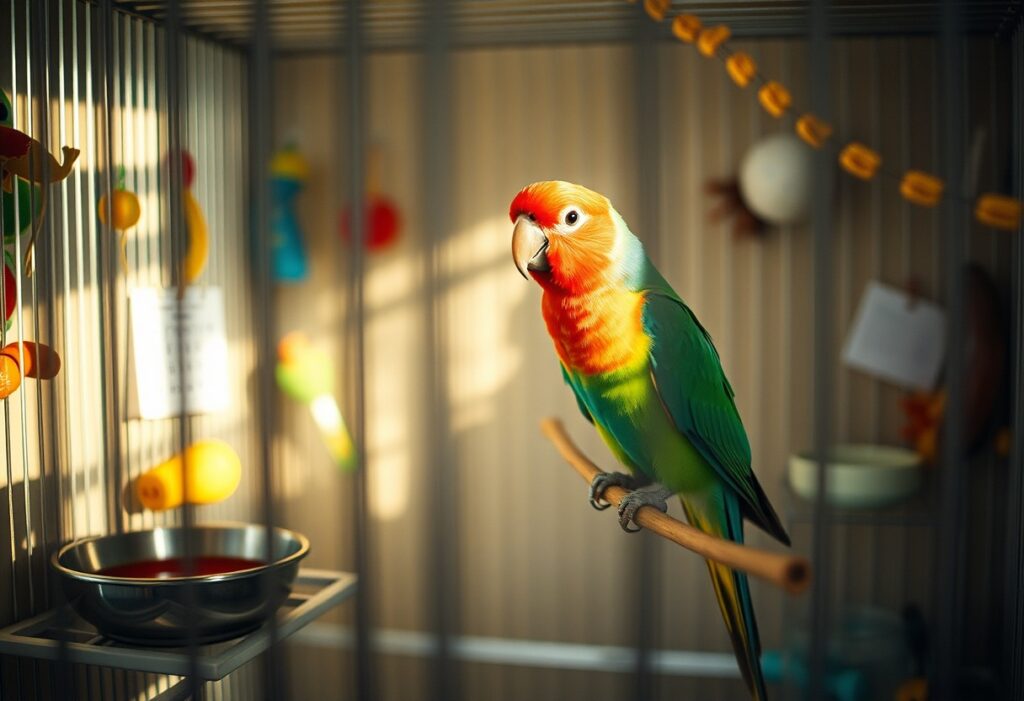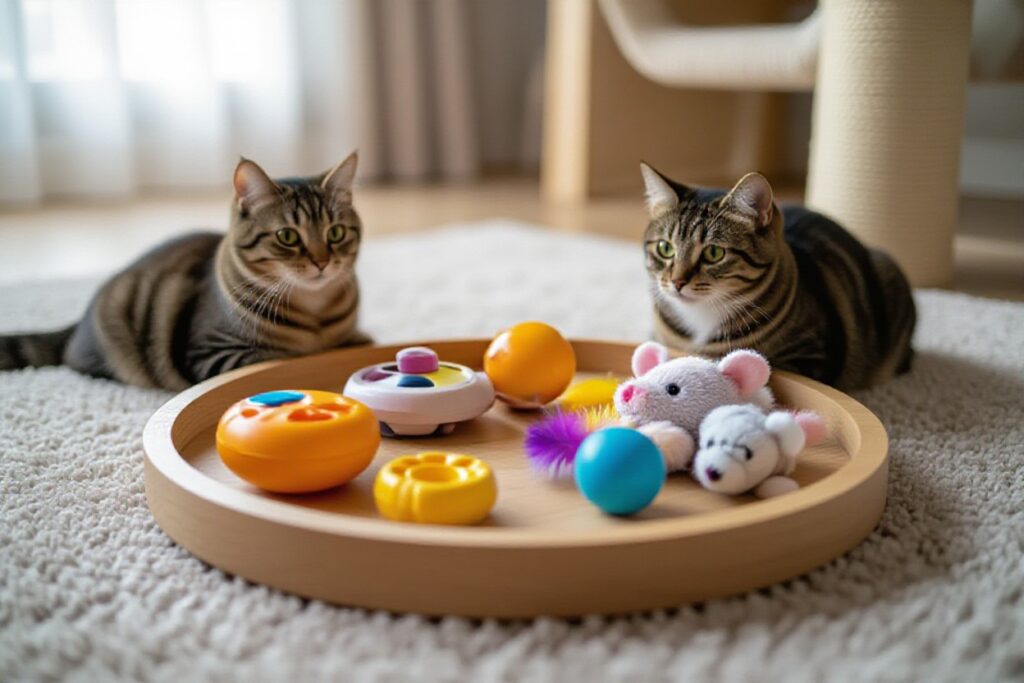Many pet bird owners underestimate the importance of establishing a consistent routine for their feathered friends. A structured schedule not only promotes mental stimulation but also contributes to your bird’s overall health and well-being. In this guide, you will learn how to create a daily routine that incorporates feeding, exercise, and socialization, ensuring your pet bird thrives and feels secure in its environment. Follow these practical tips to enhance your bird’s quality of life while fostering a strong bond between you and your avian companion.
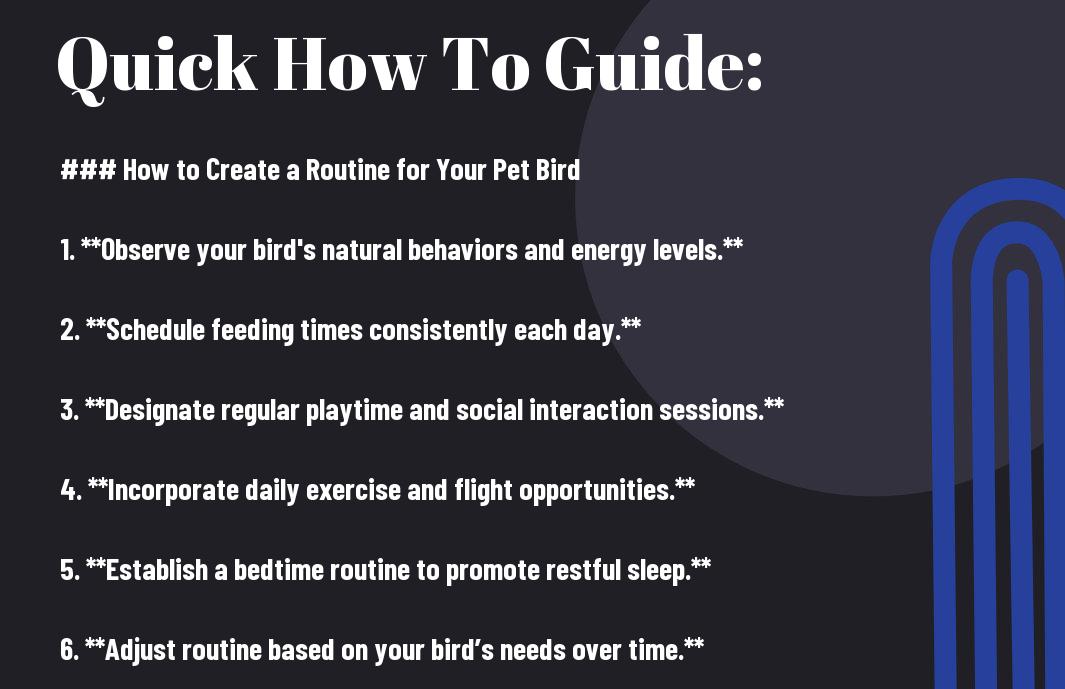
Understanding Your Pet Bird’s Needs
Before you can establish a routine for your pet bird, it’s important to grasp the different aspects that define their well-being. Birds are highly social and intelligent creatures with specific needs that must be met to ensure their physical and mental health. Creating a routine that addresses those needs will help you build a stronger bond with your feathered friend while also ensuring their happiness and longevity.
Factors to Consider
Even though each bird species can have unique requirements, there are several universal factors that you should consider when developing a routine for your pet bird. Understanding their natural behaviors and requirements can vastly improve their quality of life.
- Species: Different species of birds have varying needs in terms of social interaction, exercise, and diet. Make sure to research your bird’s specific species for tailored care.
- Age: Younger birds often need more playtime and social interaction, while older birds might enjoy a quieter and more structured environment.
- Health: Always consider your bird’s health status, as a sick bird may have reduced activity levels or different dietary requirements.
- Environment: The space in which your bird lives should offer stimulation and comfort; a cluttered or chaotic environment might lead to stress.
Thou must remember that a well-rounded routine should also include time for bonding, play, and mental challenges to keep your bird engaged and happy.
Common Behaviors of Pet Birds
Birds exhibit a range of behaviors that can give you valuable insights into their needs and preferences. Understanding these behaviors will allow you to structure your bird’s routine more effectively, providing an enriching environment that caters to their innate instincts. Some common behaviors include vocalization, preening, and social interaction with both humans and other pets. You should also take note of behaviors such as feather plucking, which can indicate stress or boredom.
Birds thrive in situations that closely mimic their natural habitats. They are known for their strong social bonds, so it’s crucial to provide ample opportunity for interaction with you and, if applicable, with other pets or birds. Additionally, they engage in mutual preening and bonding behaviors, which help them feel secure and connected. Adequate mental and physical stimulation through toys, foraging activities, and safe exploration areas will also help prevent negative behaviors caused by boredom or loneliness. If you observe your bird becoming less active or more irritable, it may be time to re-evaluate their routine and adjust it accordingly.
Needs that are met contribute positively to your bird’s overall well-being, while unmet needs can lead to serious behavioral issues or health concerns. Ensure that you offer a balanced mix of stimulation, comfort, socialization, and rest to promote a harmonious relationship with your pet bird.
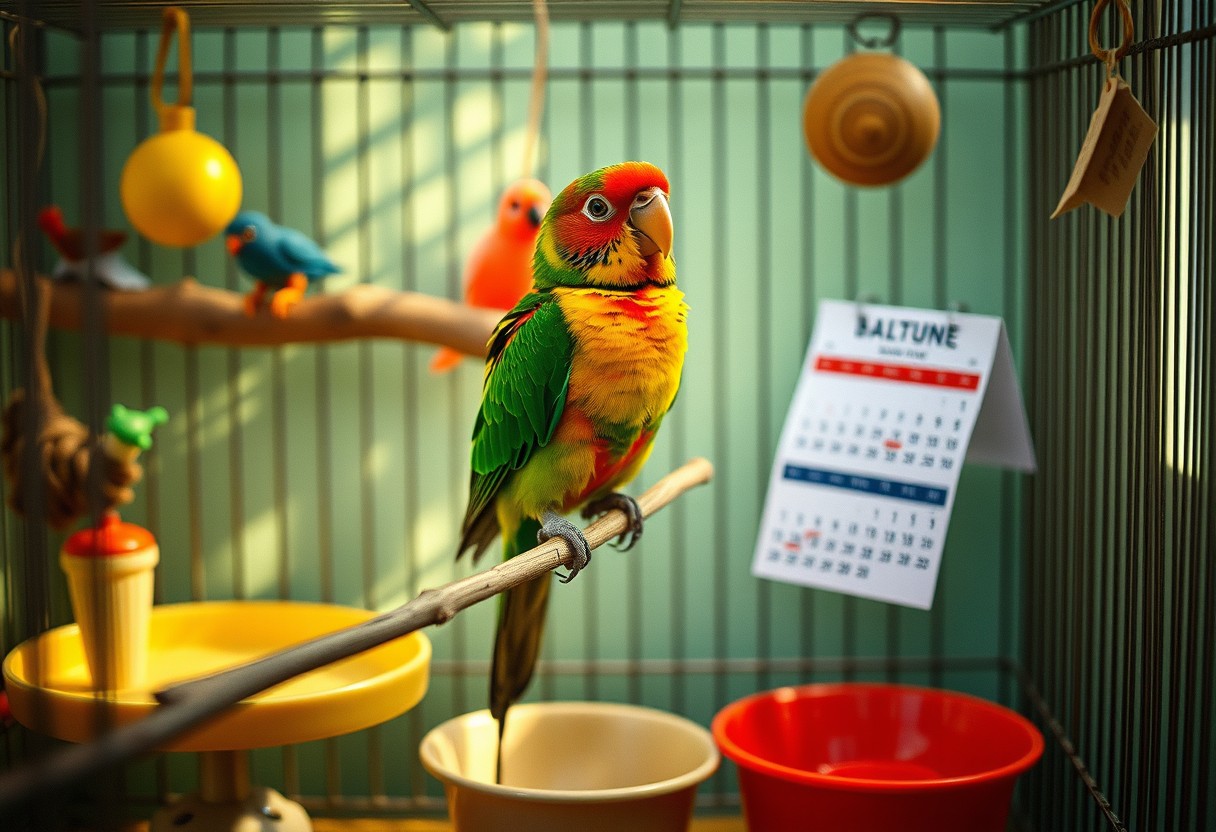
How to Establish a Daily Routine
If you are looking to create a structured and enriching environment for your pet bird, establishing a daily routine is crucial. Consistency helps your bird feel secure and comfortable in its surroundings, as it will come to expect certain activities at specific times throughout the day. This not only fosters trust between you and your feathered friend, but it also promotes a healthy lifestyle overall.
Morning Activities
The morning is a crucial time for you and your bird. Start by unveiling the cage curtains or opening the cage door to let in natural light. This signals to your bird that it’s time to wake up. Some birds may enjoy a morning greeting or a little gentle conversation. This interaction helps to build your bond and sets the tone for a positive day. After a few moments of interaction, consider allowing your bird some time out of its cage for stretching and exercising its wings.
Your morning routine might also include a brief cleaning session of the cage and surroundings. A clean habitat is imperative for your bird’s health, so take this opportunity to remove any waste or uneaten food from the previous day. A tidy living space not only keeps your bird healthy but also creates a more pleasant environment for both of you.
Feeding Schedule
Clearly establishing a feeding schedule is paramount in your bird’s routine. Birds thrive on consistency, and knowing when to expect their meals can help mitigate anxiety. Typically, it’s best to offer food in the morning shortly after your bird wakes up and again in the evening to simulate a natural feeding cycle. Make sure to provide a variety of fresh fruits, vegetables, and high-quality pellets to ensure your bird receives the balanced diet it needs.
In addition to the main meal times, you can introduce small healthy snacks throughout the day. This not only adds a variety of flavors to your bird’s diet but also can be a rewarding experience for them during your training sessions. For instance, providing treats when your bird is successfully engaging with you or accomplishing tasks can reinforce positive behaviors.
Playtime and Social Interaction
For your bird’s emotional well-being, regular playtime and social interaction are vital. Set aside dedicated time each day to interact with your bird through play and physical activity. This could be in the form of interactive toys specifically designed for birds, or you can engage in simple activities like letting your bird explore a safe area outside the cage. Ensuring that play sessions are frequent will help to keep your bird stimulated and entertained, promoting good mental health.
Playtime also deepens the bond between you and your bird. Social interaction is crucial for a bird’s happiness; they are naturally social animals that enjoy companionship. Rotate their toys and introduce new activities every week to keep things fresh and exciting, enabling your bird to feel engaged in its environment.
Nighttime Preparation
If you want to establish a successful nighttime routine for your bird, start preparing it for bed a couple of hours before you intend for it to sleep. You can begin by dimming the lights and creating a calm atmosphere, which signals that the day is coming to an end. Covering the cage with a light, breathable fabric can also provide a sense of security, mimicking their natural environment and indicating to your bird that it is time to wind down.
As nighttime approaches, it is crucial to ensure that any toys or perches are safely secured, and hazards are minimized to prevent any accidents during the night. Routine can help your bird to understand when it is expected to sleep, contributing to a sound rest each night.
Routine is the foundation of a stable and enriching life for your pet bird. By following a structured daily schedule encompassing morning activities, feeding times, playtime, and nighttime preparations, you enhance not just your bird’s well-being but also your bond with it. Ultimately, a happy bird makes for a happy owner!
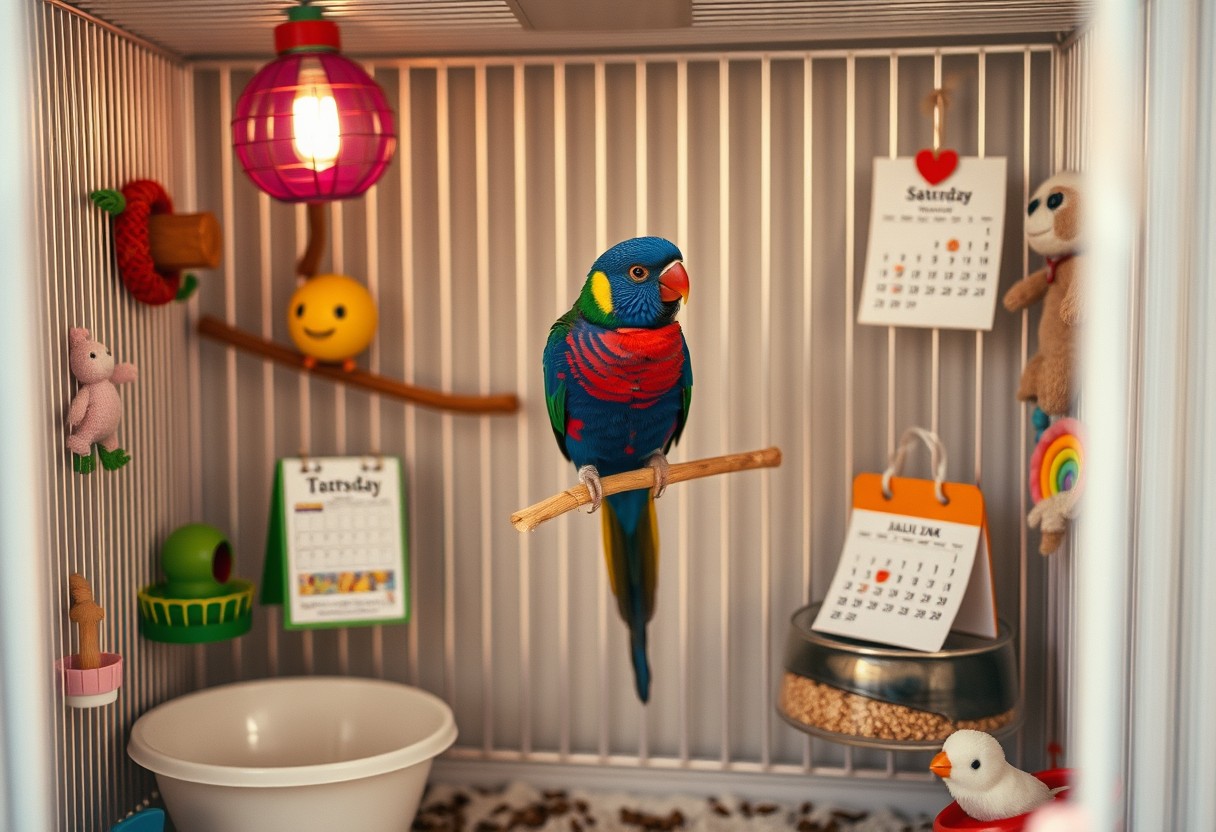
Tips for Maintaining Consistency
Not only does maintaining consistency in your pet bird’s routine help them feel secure, but it also aids in their overall well-being. Here are some practical tips to ensure you remain consistent with your bird’s daily activities:
- Establish a set schedule for feeding, playtime, and rest.
- Use visual or auditory reminders to help keep you on track.
- Involve your family in the routine to ensure everyone is on the same page.
- Regularly assess your bird’s response to the routine and make adjustments as necessary.
Knowing that your bird thrives on routine can make it easier for you to stay committed to these practices. Keeping everything consistent is key to fostering a happy and healthy environment for your feathered friend.
Adjusting the Routine
Any routine can benefit from occasional adjustments to accommodate your bird’s changing needs or your own lifestyle changes. When introducing alterations, do so gradually to prevent overwhelming your bird. For example, if you need to change their feeding time, shift it by 15 to 30 minutes over a few days until they’re comfortable with the new schedule.
It’s important to stay observant during this transition period. Monitor your bird’s behavior closely; signs of stress, such as changes in vocalizations or eating habits, can indicate that they’re struggling to adapt. If this occurs, consider reverting to the previous routine before trying to make another change.
Keeping Track of Changes
Even the smallest changes in your bird’s routine can have significant effects. Keeping detailed notes can help you track what works and what doesn’t. Create a dedicated journal or a schedule chart to monitor daily activities, feeding habits, and behavioral patterns. Not only will this help you see progress, but it will also highlight any troubling signs early.
This organized approach not only keeps you accountable but can also serve as a valuable resource for your avian veterinarian should any questions or concerns about your bird’s health arise. The more data you collect, the better you’ll understand what truly benefits your feathered companion.
Introducing New Activities
You can also enrich your bird’s life through new activities that stimulate their minds and bodies. Gradually integrating new toys or games can keep your pet engaged and prevent boredom. Ensure that any toys or activities are free from hazardous materials and safe for your bird’s size and species. Monitor their initial reactions to new items to gauge if they are comfortable and intrigued, rather than stressed.
Activities that involve flight, exploration, or problem-solving can be particularly beneficial. These stimulate your bird intellectually and provide excellent exercise opportunities. Strongly consider incorporating different types of toys, such as puzzles or foraging tools, to keep their environment lively and interesting.
Activities should always prioritize your bird’s safety. Ensure that any new environment is free from toxic plants or hidden dangers that could hurt your pet. Constant supervision during playtime can prevent accidents and ensure a positive experience.
To Wrap Up
So, establishing a routine for your pet bird is not only beneficial for their happiness and well-being, but it also strengthens the bond between you and your feathered friend. By incorporating daily schedules that include feeding, socialization, and mental stimulation, you create a predictable environment that significantly reduces stress for your bird. Remember to take into consideration your bird’s natural behaviors and preferences, allowing for flexibility within the routine to accommodate any changes. This consistency will lead to a more confident and secure pet.
Additionally, as you implement this routine, don’t hesitate to observe and tune into the unique needs of your bird. Every bird has its own personality and preferences; adapt your schedule as necessary to enhance their health and happiness. Regularly assessing activities, interactions, and even their diet will ensure that your routine remains effective and beneficial. By committing to this process, you will cultivate a thriving home environment that supports your pet bird’s well-being for years to come.
FAQ
Q: Why is it important to establish a routine for my pet bird?
A: Establishing a routine for your pet bird is crucial for its overall well-being. Birds are creatures of habit, and a consistent daily schedule can help reduce stress and anxiety. A routine provides a sense of security and predictability, which can minimize behavioral issues and promote mental stimulation. Additionally, routines can aid in regular feeding and exercise, ensuring your bird remains healthy and happy.
Q: What should be included in a daily routine for my pet bird?
A: A daily routine for your pet bird should include several key elements. First, set consistent feeding times, as this will help regulate your bird’s metabolism and encourage good eating habits. Second, plan for daily interaction, such as playtime and training, to enhance the bond between you and your bird. Additionally, include opportunities for mental stimulation through toys and puzzles, and regular out-of-cage time for exercise. Finally, make time for pre-bedtime rituals, like covering the cage, to signal to your bird that it’s time to wind down. Structuring these elements into your routine can significantly benefit your bird’s mental and physical health.
Q: How can I adapt my bird’s routine if I have a busy schedule?
A: Adapting your bird’s routine to fit a busy schedule can be challenging, but it’s definitely achievable. Start by prioritizing the most important aspects of your bird’s day, such as feeding and social interaction. You can utilize automated feeders to ensure your bird receives its meals even when you’re occupied. Schedule interactive play or training sessions during your available time, even if it’s short bursts throughout the day. Consider setting up enriching activities, like puzzle toys, that your bird can entertain itself with while you’re away. Lastly, always try to maintain a consistent sleeping schedule to ensure your bird gets adequate rest, which will help them stay healthy. Keep in mind, a few minutes of quality interaction can be just as beneficial as longer sessions.
